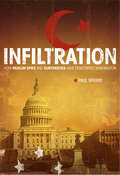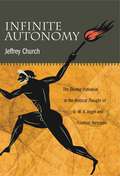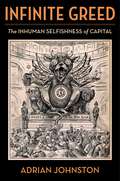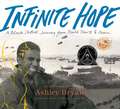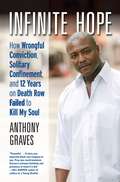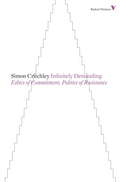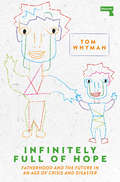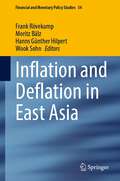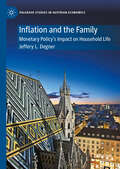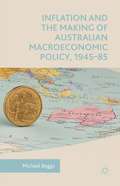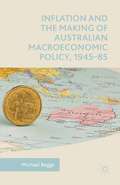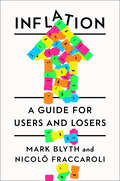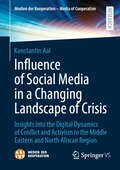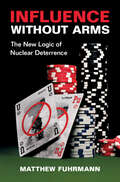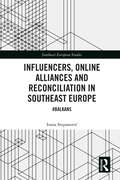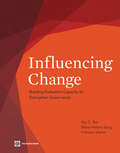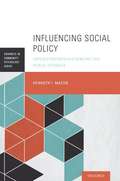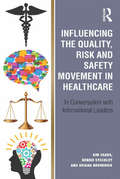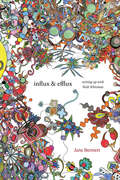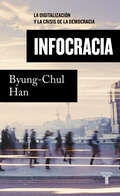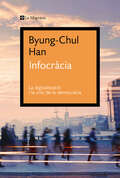- Table View
- List View
Infiltration: How Muslim Spies and Subversives have Penetrated Washington
by Paul SperryAs Americans continue to worship at the altar of cultural diversity and endorse religious tolerance for tolerance sake, Muslims masquerading as "moderates" have insinuated themselves into the very fabric of American society, taking advantage of our blind trust and gaining footholds in our education system, government, workplace, law enforcement, and military. In this startling book, investigative journalist Paul Sperry uses revealing new interviews and classified documents to courageously explain how, for the past thirty years, these Islamist extremists have been covertly working to destroy our constitutional government and the Judeo-Christian ethics on which our nation was built. Their goal, according to Sperry, is to replace the U.S. Constitution with the Quran and turn America into an Islamic state. And, as Sperry details point-by-point, they have been unwittingly aided in their sinister aims by the politically correct media, government, and citizens, who don't fully understand the dangers of the Muslim faith. Infiltration explodes the facade of moderation and patriotism that Muslim scholars, imams, clerics, businessmen, and other leaders in the burgeoning Muslim community in America have conveyed in the wake of the 9/11 terrorist attacks. In reality, the Muslim establishment that publicly decries the radical fringe-represented by al-Qaida's brand of Islam known as Wahhabism, the official religion of Saudi Arabia-is actually a part of it. The only difference is that they use words and money instead of bombs to accomplish their goals. Now, thanks to Sperry's peerless research, piquant prose, and forthright presentation, their cover is blown. He will not only make readers forget nearly everything they've been told about these "moderate" and "mainstream" leaders, he will expose the true agenda of these "moderate" and "mainstream" leaders, and he will explain the full scope of the dangerous threat of Islam in America. With everyone still on edge after 9/11, this book will garner wide interest, appealing specifically to people interested in current events and/or religion. Additionally, the book will appeal strongly to women whose roles, values, and rights are greatly threatened by fundamentalist Islam.
Infinite Autonomy: The Divided Individual in the Political Thought of G. W. F. Hegel and Friedrich Nietzsche
by Jeffrey ChurchG. W. F. Hegel and Friedrich Nietzsche are often considered the philosophical antipodes of the nineteenth century. In Infinite Autonomy, Jeffrey Church draws on the thinking of both Hegel and Nietzsche to assess the modern Western defense of individuality—to consider whether we were right to reject the ancient model of community above the individual. The theoretical and practical implications of this project are important, because the proper defense of the individual allows for the survival of modern liberal institutions in the face of non-Western critics who value communal goals at the expense of individual rights. By drawing from Hegelian and Nietzschean ideas of autonomy, Church finds a third way for the individual—what he calls the “historical individual,” which goes beyond the disagreements of the ancients and the moderns while nonetheless incorporating their distinctive contributions.
Infinite Greed: The Inhuman Selfishness of Capital (Insurrections: Critical Studies in Religion, Politics, and Culture)
by Adrian JohnstonSelfishness is essential to capitalism—or so both advocates and opponents claim. In Infinite Greed, Adrian Johnston argues that this consensus is mistaken. Through a novel synthesis of Marxism and psychoanalysis, he reveals how the relentless pursuit of profits is not fundamentally animated by human acquisitiveness. Instead, capitalism’s strange “infinite greed” demands that individuals sacrifice their pleasures, their well-being, and even themselves to serve inhuman capital.Johnston traces the mechanisms that compel capitalist subjects to obey the cold imperative to accumulate in perpetuity and without limits—and also without regard for the consequences for everyone and everything else. Facing crises such as spiraling wealth inequality and the profit-driven prospect of a looming ecological apocalypse, the rational self-interest of the majority would seem to dictate putting a stop to capitalist accumulation. By bringing together the Marxian critique of political economy with psychoanalytic metapsychology, Johnston shows why and how capitalism, rather than being responsive to people’s rationally selfish interests, disregards and overrides them instead.Unlike previous syntheses of Marxism and psychoanalysis, Infinite Greed pairs Freudian and Lacanian concepts with the economic heart of Marx’s historical materialism. In so doing, Johnston brings to light the complex intertwining of political and libidinal economies keeping us invested and complicit in perpetuating capitalism and its ills.
Infinite Hope: A Black Artist's Journey from World War II to Peace
by Ashley BryanThis book details artist Ashley Bryan's experiences as a Black soldier in the segregated army of WWII, and how love and the pursuit of art sustained him. In May of 1942, at the age of eighteen, Ashley Bryan was drafted to fight in World War II. For the next three years, he would face the horrors of war as a black soldier in a segregated army. He endured the terrible lies white officers told about the black soldiers to isolate them from anyone who showed kindness - including each other. He received worse treatment than even Nazi POWs. He was assigned the grimmest, most horrific tasks, like burying fallen soldiers-but was told to remove the black soldiers first because the media didnot want them in their newsreels. And he waited and wanted so desperately to go home, watching every white soldier get safe passage back to the United States before black soldiers were even a thought. For the next forty years, Ashley would keep his time in the war a secret. But now, he tells his story. The story of the kind people who supported him. The story of the bright moments that guided him through the dark. And the story of his passion for art that would save him time and time again. Filled with never-before-seen artwork and handwritten letters and diary entries, this illuminating and moving memoir by Newbery Honor-winning illustrator Ashley Bryan is both a lesson in history and a testament to hope.
Infinite Hope: How Wrongful Conviction, Solitary Confinement, and 12 Years on Death Row Failedto Kill My Soul
by Anthony GravesWritten by a wrongfully convicted man who spent 16 years in solitary confinement and 12 years on death row, a powerful memoir about fighting for--and winning--exoneration.In the summer of 1992, a grandmother, a teenage girl, and four children under the age of ten were beaten and stabbed to death in Somerville, Texas. The perpetrator set the house on fire to cover his tracks, deepening the heinousness of the crime and rocking the tiny community to its core. Authorities were eager to make an arrest. Five days later, Anthony Graves was in custody.Graves, then twenty-six years old and without an attorney, was certain that his innocence was obvious. He did not know the victims, he had no knowledge about the crime, and he had an airtight alibi with witnesses. There was also no physical evidence linking him to the scene. Yet Graves was indicted, convicted of capital murder, sentenced to death, and, over the course of twelve years on death row, given two execution dates. He was not freed for eighteen years, two months, four days.Through years of suffering the whims of rogue prosecutors, vote-hungry district attorneys, and Texas State Rangers who played by their own rules, Graves was frequently exposed to the dire realities of being poor and black in the criminal justice system. He witnessed fellow inmates who became his friends and confidants be taken away, one by one, to their deaths. And he missed out on seeing his three young sons mature into men. Graves's only solace was his infinite hope that the state would not execute him for a crime he did not commit. To maintain his dignity and sanity, Graves made sure as many people as possible knew about his case. He wrote letters to whomever he thought would listen. Pen pals in countries all over the world became allies, and he attracted the attention of a savvy legal team that overcame setback after setback, chiseling away at the state's faulty case against him. Everyone's efforts eventually worked. After Graves's exoneration, the original prosecutor on his case was disbarred.Graves is one of a growing number of innocent people exonerated from death row. The moving account of his saga--of his ultimate fight for freedom from inside a prison cell--is as haunting as it is poignant, and as shameful to the legal system as it is inspiring to those on the losing end of it.
Infinite Suburbia
by Alan Berger Joek Kotkin MIT Norman B. Leventhal Center for Advanced UrbanismInfinite Suburbia is the culmination of the MIT Norman B. Leventhal Center for Advanced Urbanism's yearlong study of the future of suburban development. Extensive research, an exhibition, and a conference at MIT's Media Lab, this groundbreaking collection presents fifty-two essays by seventy-four authors from twenty different fields, including, but not limited to, design, architecture, landscape, planning, history, demographics, social justice, familial trends, policy, energy, mobility, health, environment, economics, and applied and future technologies. This exhaustive compilation is richly illustrated with a wealth of photography, aerial drone shots, drawings, plans, diagrams, charts, maps, and archival materials, making it the definitive statement on suburbia at the beginning of the twenty-first century.
Infinitely Demanding
by Simon CritchleyThe clearest, boldest and most systematic statement of Simon Critchley's influential views on philosophy, ethics, and politics, Infinitely Demanding identifies a massive political disappointment at the heart of liberal democracy. Arguing that what is called for is an ethics of commitment that can inform a radical politics, Critchley considers the possibility of political subjectivity and action after Marx and Marxism, taking in the work of Kant, Levinas, Badiou and Lacan. Infinitely Demanding culminates in an argument for anarchism as an ethical practice and a remotivating means of political organization.From the Trade Paperback edition.
Infinitely Full of Hope: Fatherhood and the Future in an Age of Crisis and Disaster
by Tom WhymanA philosophical memoir about becoming a father in an increasingly terrible world – can I hope the child growing in my partner's womb will have a good-enough life?A philosophical memoir about becoming a father in an increasingly terrible world. Can I hope the child growing in my partner&’s womb will have a good-enough life? For Kant, philosophy boiled down to three key questions: &“What can I know?&”, &“What ought I do?&”, and &“What can I hope for?&” In philosophy departments, that third question has largely been neglected at the expense of the first two – even though it is crucial for understanding why anyone might ask them in the first place. In Infinitely Full of Hope, as he prepares to become a father for the first time, the philosopher Tom Whyman attempts to answer Kant&’s third question, trying to make sense of it in the context of a world that increasingly seems like it is on the verge of collapse. Part memoir, part theory, and part reflection on fatherhood, Infinitely Full of Hope asks how we can cling to hope in a world marked by crisis and disaster.
Inflation Targeting Under Imperfect Policy Credibility
by Ali Alichi Charles Freedman Douglas Laxton Marianne Johnson Ondra Kamenik Huigang Chen Kevin Clinton Turgut KișinbayA report from the International Monetary Fund.
Inflation and Deflation in East Asia (Financial and Monetary Policy Studies #54)
by Frank Rövekamp Moritz Bälz Hanns Günther Hilpert Wook SohnIn light of the deflationary trends following the 2008/2009 financial crisis, as well as the return of inflation triggered by the COVID-19 pandemic and the war in Ukraine, this book offers insights into price stability issues in various East Asian countries. Leading scholars from the fields of economics and law as well as central bank practitioners present case studies on Japan, Korea, Singapore, and Taiwan. The contributors address topics such as quantitative monetary easing, the role of global and domestic shocks on inflation dynamics, and other monetary policy issues. In doing so, the book goes into detail about the individual forces and effects of deflation and inflation and compares the Asian experience with that of the Eurozone.
Inflation and the Family: Monetary Policy's Impact on Household Life (Palgrave Studies in Austrian Economics)
by Jeffery L. DegnerThis book provides unique insight into the relationship between economics and family life. Taking ideas from the Austrian school of economics’ understanding of monetary theory, it delves into the drivers of family formation, fertility, and family disintegration, with a particular focus on the role of inflation and inflationary policy. By placing questions surrounding family life within a political economy setting, the impact of relative price changes, inflation culture, and specific monetary policies on the role and structure of the family are highlighted. This book offers a nuanced and robust understanding of the economic causes of the deinstitutionalization of traditional family life. It will be relevant to students and researchers interested in monetary economics and the economics of the family.
Inflation and the Making of Australian Macroeconomic Policy, 1945–85
by Michael BeggsInflation and the Making of Australian Macroeconomic Policy, 1945–85.
Inflation and the Making of Australian Macroeconomic Policy, 1945–85
by Michael BeggsIn the decades after World War II, inflation undermined the aspiration for full employment in Australia. This book tells the story of how the Australian state was shaped by the confrontation with monetary instability: a pre-history of neoliberalism.
Inflation: A Guide for Users and Losers
by Mark Blyth Nicolò Fraccaroli"An essential dose of clear thinking on one of the most contentious issues in economic policy." —Adam Tooze A fresh, revealing, and myth-busting guide to the ins and outs of inflation from two leading political economists. Inflation is back, and its impact can be felt everywhere, from the grocery store to the mortgage market to the results of elections around the world. What's more, tariffs and trade wars threaten to accelerate inflation again. Yet the conventional wisdom about inflation is stuck in the past. Since the 1970s, there has only really been one playbook for fighting inflation: raise interest rates, thereby creating unemployment and a recession, which will lower prices. But this simple story hides a multitude of beliefs about why prices go up and how policymakers can wrestle them back down, beliefs that are often wrong, damaging, and have little empirical basis. Leading political economists Mark Blyth and Nicolò Fraccaroli reveal why inflation really happens, challenge how we think about it, and argue for fresh approaches to combat it. With accessible and engaging commentary, and a good dose of humor, Blyth and Fraccaroli bring the complexities of economic policy and inflation indices down to earth. Policymakers around the world may have pulled off a so-called "soft landing," but Inflation warns they must update their thinking. Now tariffs, climate shocks, demographic change, geopolitical tensions, and politicians promising to upend the global order are all combining to create a more inflationary future, making a new paradigm for understanding inflation urgently necessary. Astute, timely, and engaging, Inflation is a must-read for anyone seeking to understand the forces shaping our economy and politics.
Influence from Abroad
by Danny Hayes Matt GuardinoIn Influence from Abroad, Danny Hayes and Matt Guardino show that United States public opinion about American foreign policy can be shaped by foreign leaders and representatives of international organizations. By studying news coverage, elite debate, and public opinion prior to the Iraq War, the authors demonstrate that U. S. media outlets aired and published a significant amount of opposition to the invasion from official sources abroad, including British, French, and United Nations representatives. In turn, these foreign voices - to which millions of Americans were exposed - drove many Democrats and independents to signal opposition to the war, even as domestic elites supported it. Contrary to conventional wisdom that Americans care little about the views of foreigners, this book shows that international officials can alter domestic public opinion, but only when the media deem them newsworthy. Their conclusions raise significant questions about the democratic quality of United States foreign policy debates.
Influence of Social Media in a Changing Landscape of Crisis: Insights into the Digital Dynamics of Conflict and Activism in the Middle Eastern and North African Region (Medien der Kooperation – Media of Cooperation)
by Konstantin AalSocial media and information and communication technologies (ICTs) have played a pivotal role in various conflicts around the world, including the Arab Spring in Tunisia, the war in Syria, Palestinian activism, and the recent protests in Iran. This book examines the use and impact of ICT and social media in these conflicts, focusing on countries in the MENA region. The research takes an on-the-ground approach, working closely with local people to understand their everyday use and appropriation of social media and ICT. The author presents four studies covering different aspects of social media use in conflict: the evolution of the media landscape in post-uprising Tunisia; Palestinian activists using social media to oppose the construction of the wall; the role of social media among Syrian Free Army fighters, activists and refugees; and young Iranians' strategies for circumventing internet restrictions. These studies reveal the ways in which social media and conflict intersect. The research assesses the impact of social media in these settings, considering the historical, socio-economic and socio-technical dynamics of the regions. Finally, the dissertation critically reflects on the methods used in this fieldwork, emphasizing the role of the researcher and personal biases.
Influence without Arms: The New Logic of Nuclear Deterrence
by Matthew FuhrmannHow does nuclear technology influence international relations? While many books focus on countries armed with nuclear weapons, this volume puts the spotlight on those that have the technology to build nuclear bombs but choose not to. These weapons-capable countries, such as Brazil, Germany, and Japan, have what is known as nuclear latency, and they shape world politics in important ways. Offering a definitive account of nuclear latency, Matthew Fuhrmann navigates a critical yet poorly understood issue. He identifies global trends, explains why countries obtain nuclear latency, and analyzes its consequences for international security. Influence Without Arms presents new statistical and case evidence that nuclear latency enhances deterrence and provides greater influence but also triggers conflict and arms races. The book offers a framework to explain when nuclear latency increases security and when it incites instability, and generates far-reaching implications for deterrence, nuclear proliferation, arms races, preventive war, and disarmament.
Influencers, Online Alliances and Reconciliation in Southeast Europe: #Balkans (Southeast European Studies)
by Ivana StepanovicThis book explores the transformative role of social media in fostering reconciliation in the former Yugoslavia, a region still grappling with unresolved conflicts and ethnic divides. Focusing on platforms like YouTube and TikTok, it highlights how Balkan influencers blend personal storytelling with commercial outreach to promote interethnic understanding. The study employs digital ethnography and narrative analysis to reveal the intricate dynamics between human actors and algorithms, uncovering how social media facilitate grassroots reconciliation initiatives.The author critiques traditional reconciliation efforts driven by political elites and emphasises the potential of bottom-up approaches enabled by social media. It presents the concept of “algorithmic reconciliation”, where social media algorithms inadvertently foster interethnic collaborations and create transnational online communities. By examining the economic and cultural practices of influencers, the book illustrates how digital platforms can serve as modern arenas for peacebuilding.This book is primarily aimed at undergraduates and postgraduates in social history, digital media studies, and peace studies, but will also be relevant to academics, policymakers, and anyone interested in the intersection of technology and social change.
Influencing Change
by Ray C. Rist Marie-Helene Boily Frederic MartinIn the first section of this book, four chapters explore how evaluation can influence and interact with the change process in policy and institutional development. Wijayatilake recalls a convincing and riveting story about how evaluation was introduced in Sri-Lanka and what kind of striking results could be achieved in a few years through a progressive pragmatic approach and strong leadership. Wiesner reviews the role of evaluation in the formation of macroeconomic policy in Latin America and outlines the role of demand for improved results and performance and of the accountability from the politicians, the private sector and civil society and, in the end, the population. Dimitrov proposes a 7 step approach for tacking institutional Performance evaluation and applies it to the case of the Black Sea Trade and Development Bank. Jaljouli addresses the challenge of the integration of development strategy and the evaluation process and uses Dubai as a case study. In the second section of this book, five chapters present a variety of lessons learnt and good practices in Evaluation Capacity Building (ECB). Heider presents a structured approach to capacity development working at three levels: individual training, institutional development, and an enabling environment and suggests moving from capacities to capabilities. Agrawal and Rao identify various factions influencing the use of evaluation results and show in the case of India how capacity building was used to increase this use. Andriantseheno addresses how an M and E system for a major development program can be set up as part of a programmatic approach using the case study of the Environment/Rural Development and Food Security program in Madagascar. Porter outlines the potential of the helping approaches an evaluation capacity development strategy and uses the Bana Barona/Abantwanu Bethu project in South Africa to prove his point. Clotteau et al. review major challenges in ECB and present a variety of ECB strategies to design and implement Results-Based National M and E systems, building upon a number of experiences in Africa, Asia, and Latin America. The third section of the book discusses new perspectives on ECB. Picciotto outlines a path for the future of development evaluation on the basis of a review of emerging endogenous and exogenous trends. By surveying recent theoretical developments in ECB, Nielsen and Attström map the perspectives offered by the contributors in terms of scope, purpose, definitions, and methods and relate key findings and recommendations to the ECB framework offered by Heider' chapter. Van den Berg illustrates how evaluation capacity has been developed and could be further developed in a critical area for the future, i.e. in environment and development. From a review of the first and second sections of the book, Dahlgren underlines that building up evaluation capacity requires not only competence and quality, but taking into account the political and institutional context, cost aspects, the relative importance between learning and accountability, and the differences and similarities between monitoring and evaluation. Finally, following a review of the same papers, McAllister explores the interface between the evaluation function and organizational leadership in setting results strategy and the limitation of results approaches as implemented by the international development community. Overall, the stimulating comparative analysis of the papers presented in sections 1 and 2, questions and own thoughts on perspectives for ECB in the future made by those senior evaluation specialists allow for a more thorough and nuanced book.
Influencing Social Policy: Applied Psychology Serving the Public Interest (Advances In Community Psychology Ser.)
by Kenneth I. MatonInfluencing Social Policy synthesizes current knowledge about how psychologists influence social policy to serve the public interest. The volume builds upon interviews with 79 applied psychologists about their experiences in the policy domain, with special focus on the work of applied developmental psychologists, applied social psychologists, and community psychologists. Additional foundations of the volume include a review of social science scholarship across a wide range of disciplines, and author Kenneth Maton's 30 years of teaching on the topic, including frequent interactions with Washington, DC, policy experts. <P><P>Together, these sources provide in-depth information about how applied psychologists influence social policy, the factors that contribute to their success, the challenges they face, and the approaches used to address those challenges. The policy influences described span all three branches of government: legislative, executive, and judicial. The policy content areas are diverse, including the death penalty prohibition for adolescents, early childhood education, gay marriage, gender discrimination in the workplace, health and mental health care reform, homelessness, home visiting programs, sexually abused child witness treatment, status offender diversion from the juvenile justice system, substance abuse prevention, and many others. Influencing Social Policy is a must-have resource for graduate students and professionals in a wide variety of disciplines with interests in influencing social policy, including psychology, education, public health, social work, policy studies, anthropology, and sociology.
Influencing the Quality, Risk and Safety Movement in Healthcare: In Conversation with International Leaders
by Kim Sears Denise StockleyInfluencing the Quality, Risk and Safety Movement in Healthcare explores the inner workings of some of the most influential minds in healthcare quality, risk and safety. The book was created in cooperation with the Master of Science in Healthcare Quality graduate program, developed and delivered by Queen’s University, Canada. This is the only standalone interdisciplinary Master of Science graduate degree in Healthcare Quality in North America that focuses on creating tomorrow’s healthcare leaders. Following a one-to-one collaboration between each leader in healthcare with a dedicated learner of the MSc(HQ), readers are presented with a synopsis of the leader’s work followed by an in-depth interview with him or her. Interviews center around the leaders’ contributions to and thoughts on quality, risk and safety in healthcare, dealing with topics such as the development of their body of work, their greatest achievements, what they wish they could change, and future direction of quality, risk and safety, etc. The book provides a unique and highly accessible view into how and why the science of healthcare quality has developed, as well as giving a first-hand account of the founders and key players in the movement. It will offer valuable insights to any undergraduate/graduate class with an interest in healthcare, as well as professionals working within any of the many disciplines that can influence the healthcare system.
Influx and Efflux: Writing Up with Walt Whitman
by Jane BennettIn influx & efflux Jane Bennett pursues a question that was bracketed in her book Vibrant Matter: how to think about human agency in a world teeming with powerful nonhuman influences? “Influx & efflux”—a phrase borrowed from Whitman's "Song of Myself"—refers to everyday movements whereby outside influences enter bodies, infuse and confuse their organization, and then exit, themselves having been transformed into something new. How to describe the human efforts involved in that process? What kinds of “I” and “we” can live well and act effectively in a world of so many other lively materialities? Drawing upon Whitman, Thoreau, Caillois, Whitehead, and other poetic writers, Bennett links a nonanthropocentric model of self to a radically egalitarian pluralism and also to a syntax and style of writing appropriate to the entangled world in which we live. The book tries to enact the uncanny process by which we “write up” influences that pervade, enable, and disrupt us.
Infocracia: La digitalización y la crisis de la democracia
by Byung-Chul HanUn análisis sagaz del régimen de la información, el nuevo gobierno al que estamos sometidos, por el filósofo más leído del siglo XXI. La digitalización avanza inexorablemente. Aturdidos por el frenesí de la comunicación y la información, nos sentimos impotentes ante el tsunami de datos que despliega fuerzas destructivas y deformantes. Hoy la digitalización también afecta a la esfera política y provoca graves trastornos en el proceso democrático. Las campañas electorales son guerras de información que se libran con todos los medios técnicos y psicológicos imaginables. Los bots -las cuentas falsas automatizadas en las redes sociales- difunden noticias falsas y discursos de odio e influyen en la formación de la opinión pública. Los ejércitos de trolls intervienen en las campañas apuntalando la desinformación. Las teorías de la conspiración y la propaganda dominan el debate político. Por medio de la psicometría y la psicopolítica digital, se intenta influir en el comportamiento electoral y evitar las decisiones conscientes. El nuevo ensayo de Byung-Chul Han describe la crisis de la democracia y la atribuye al cambio estructural de la esfera pública en el mundo digital. También le da un nombre a este fenómeno: infocracia.
Infocràcia: La digitalització i la crisi de la democràcia
by Byung-Chul HanUna anàlisi sagaç del règim de la informació, el nou govern a què estem sotmesos, pel filòsof més llegit del segle XXI. La digitalització avança inexorablement. Atordits pel frenesí de la comunicació i la informació, ens sentim impotents davant del tsunami de dades que desplega forces destructives i deformants. La digitalització també afecta l'esfera política i provoca greus trastorns en el procés democràtic. Les campanyes electorals són guerres dinformació que es lliuren amb tots els mitjans tècnics i psicològics imaginables.Els bots —els comptes falsos automatitzats a les xarxes socials— difonen notícies falses i discursos d'odi i influeixen en la formació de l'opinió pública. Els exèrcits de trolls intervenen en les campanyes apuntalant la desinformació. Les teories de la conspiració i la propaganda dominen el debat polític. Per mitjà de la psicometria i la psicopolítica digital s'intenta influir en el comportament electoral i evitar les decisions conscients. El nou assaig de Byung-Chul Han descriu la crisi de la democràcia i l'atribueix al canvi estructural de l'esfera pública al món digital. També dóna un nom a aquest fenomen: infocràcia.
Infodemic Disorder: Covid-19 Coping Strategies in Europe, Canada and Mexico
by Gevisa La Rocca Marie-Eve Carignan Giovanni Boccia ArtieriThis contributed volume identifies how the information processes of public institutions and citizens have changed throughout the COVID-19 pandemic, within a new context that emerged: the infodemic disorder. Public debate is largely characterized today by a crisis of the legitimacy of institutions, accompanied by a crisis of authority in public communication, leading to the emergency of a state of information disorder due specifically to the need to find information related to the coping of the pandemic. This condition is characterized by growing attention to issues related to ‘fake news’, ‘misinformation’, and ‘media manipulation’, that are intertwined in digital platform ecosystems, and the effects of which on democracy, public communication and research, and the sharing of information in the civic sphere are broad and far-reaching. This volume analyzes the links between communication strategies of public institutions, and the resulting citizen communication, in an attempt to tease out how communication processes have changed during the pandemic. It was decided to investigate this infodemic disorder as it appeared in three different geographical contexts: Europe, Canada and Mexico and, at the same time, to bring out the formal and informal coping strategies implemented by public institutions and citizens. Beginning with an introduction to the crisis of information created by the pandemic, the contributors build a theoretical framework, provide contagion data, and subsequently, for each of the geographical contexts analyzed, explore the public communication strategies and those activated by citizens seeking to share information.
